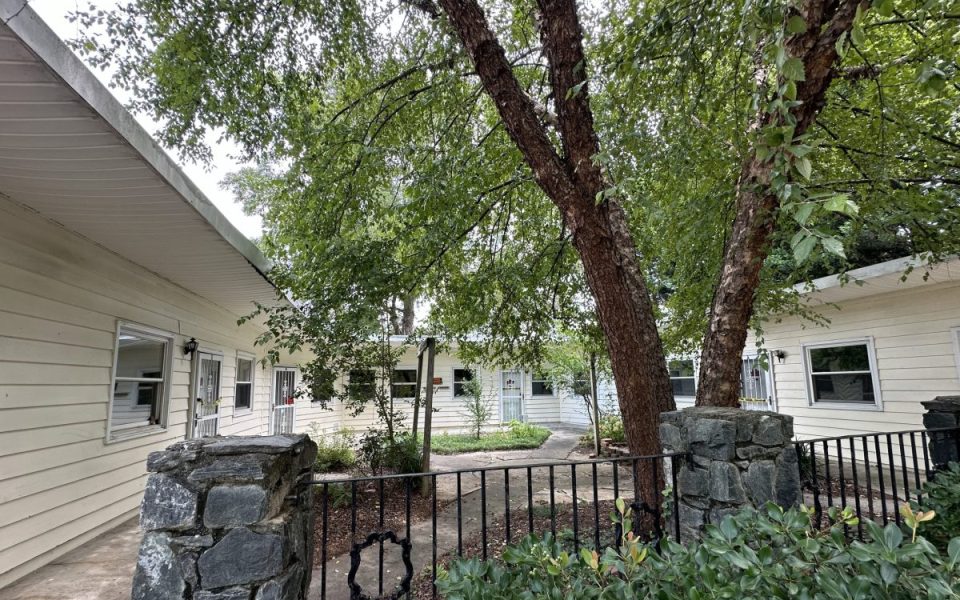Featured photo: 207 N. Spring St. (Photo by Gale Melcher)
UPDATE 8/12/24 at 4 p.m.: The resolution to forgive the lien passed with three yeas and one abstention, now it moves on to the full city council where it will be considered at their Sept. 3 meeting. A previous version of this article stated that it would be considered on Aug. 19.
Five units in a small horseshoe-shaped building at 207 N. Spring St. nestled in downtown Winston-Salem have awaited new residents for nearly a decade.
Currently owned by Partners for Homeownership, the property was used for several years by AIDS Care Service of Forsyth County until 2016.
And then it “just sat,” says Jane Milner, the president of the now-inactive Partners for Homeownership, a group that helped house hundreds of low-income Winston-Salem residents over the decades.
“And sat.”
Now, a local tenant advocacy group is seeking to purchase 207 N. Spring St. to create a cooperative housing community, which will be known as Spring Street Co-op. The goal, the organizers say, is to offer low-rent, high quality housing for people in need.
But first, a lien on 207 N. Spring St. — $156,870 — must be paid or forgiven. The property was bought by the organization in 2001 — along with 205 and 209 N. Spring St. and a few properties on Second Street — with a $426,400 loan from the city. On Monday afternoon at 2 p.m., the city’s Community Development, Housing and General Government Committee which will decide whether or not to recommend the lien forgiveness to the whole council on Sept. 3.

The background
The property at 207 N. Spring St. is a valuable pocket of real estate in downtown Winston-Salem: The 0.09 acres is valued at $35,600 while the property including the building — originally constructed in 1920 and renovated in 1965 — is valued at $131,400.
Plus, the aforementioned Spring Street properties were recently purchased by real estate investors for $265,000 and $395,000, respectively.
Milner, who retired in 2010 and is now in her eighties, says that while dozens of developers have called her over the years hoping to strike a deal, the group doesn’t want to just sell it off to the private sector.
Plus, Milner can’t sell it until the lien on the property is paid — which has scared many developers off.
A shock of yellow caution tape flutters across the door frames while bold red signs stamped with the words “No Trespassing” peer at wanderers through the slats of the doors.
But soon, the doors could swing open to welcome new inhabitants.
Local tenant advocacy group Housing Justice Now wants to purchase the property to create Spring Street Co-op, a cooperative housing community. On Saturday at the Forsyth County Central Library, the group held a dinner and discussion about co-ops for community members.

The group’s organizer, Dr. Dan Rose, who also teaches at Winston-Salem State University, told TCB that he hopes to have tenants moved in by the winter — a dangerous season that puts vulnerable unhoused residents at serious risk. (Disclosure: Rose has previously written for Triad City Beat.)
In housing co-ops, residents act as shareholders of property, making monthly payments in order to maintain good standing. The newly created Spring Street Co-op has committed to offer the units to tenants who make 30-50 percent of the area median income for a minimum of 30 years. Winston-Salem’s AMI is $54,195 so tenants would have to make no more than $27,000 per year. The co-op will be a six-member entity; the five residents plus the nonprofit Spring Street Co-op’s board of directors, which will have the “right to veto any decision of the other five members that jeopardizes the organization’s long-term mission of affordable housing.”
Housing Justice Now’s plan for Winston-Salem’s first known housing co-op is “innovative” and “out-of-the-box,” Milner said. While there aren’t many housing co-ops in this area, the concept has sprouted successful models around the country.
One of the most famous co-op examples is Co-op City in New York. The Northeast Bronx co-op boasts more than 15,000 apartments and affordable living. According to Annemarie Sammartino in an interview with NextCity, it costs around $1,600 a month to live in the largest apartment in Co-op City.
Milner told TCB that she was so excited that the building could be put back into service and go back to its “original” purpose.
Spring Street Co-op has already put down a $1,500 deposit and the property will cost a total of $5,000. But after that comes around $200,000 dollars in repairs, Rose explained.

The property was inspected in October, and Rose and other members of HJN have already begun work on cleaning up the place by power washing it over the weekend.
At a Monday, Aug. 12 meeting at 2 p.m., the four city councilmembers — Mayor Pro Tempore DD Adams, Kevin Mundy, Robert C. Clark and Annette Scippio — on the Community Development, Housing and General Government Committee — will decide whether to recommend the lien forgiveness to the whole city council, on Sept. 3. Both meetings will be held at Winston-Salem’s City Hall at 101 N. Main St.
All CityBeat reporting content is made possible by a grant from the NC Local News Lab Fund, available to republish for free by any news outlet who cares to use it. Learn More ↗
Republish this storyJoin the First Amendment Society, a membership that goes directly to funding TCB‘s newsroom.
We believe that reporting can save the world.
The TCB First Amendment Society recognizes the vital role of a free, unfettered press with a bundling of local experiences designed to build community, and unique engagements with our newsroom that will help you understand, and shape, local journalism’s critical role in uplifting the people in our cities.
All revenue goes directly into the newsroom as reporters’ salaries and freelance commissions.


Leave a Reply